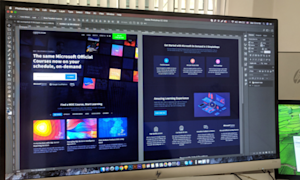Redesigning a website in 5 steps
Your website offers potential clients and customers the first impression of your company, acting as a modern business card. If you’re in charge of online marketing and visibility, chances are you’ve spent some time thinking about how to make the most of your online presence.
If your website doesn’t seem to be drawing the attention it deserves or maybe it’s no longer in line with your current branding or isn’t generating the leads you’re looking for, it might be time for a redesign.
It’s no secret that a website redesign is a huge undertaking, regardless of the size of your team. Proper research and planning are essential aspects of a website redesign. For this reason, we’re going to go over the specific steps that can help you find the most success with this project.
Here are the 5 steps to redesign a website
1- Start with a website audit
When it comes to a website redesign, you’ll need to start with a serious review of where you currently stand in relation to your marketplace and larger online perimeters on the whole. Complete an in-depth analysis of what your current online standing is and this will include a review of which of your web pages are most frequented, content that can be repurposed and content that no longer holds weight.
Consider using a tool like Google Analytics for the numbers behind how visitors interact with the pages of your website. Analytics will offer concrete data and insight into exactly what is working and what isn’t. The information you discover might surprise you and this step is absolutely necessary for moving forward.
Take concrete notes and keep track of details, as this information will be needed to complete A/B testing later. Understanding the weaknesses of your website is the best way to know where to concentrate your efforts. Of course, it’s also important to take note of the aspects of your website that are working for you. Pages which are generating traffic and converting customers may need to be optimized further but should be kept intact whenever possible.
2- Understand what’s working for your competitors
Following a detailed audit of your website, you’ll need to start looking at the competitors in your marketplace and drawing an understanding of what’s working for them. Don’t steal ideas from your competitors but instead, use their successes to draw inspiration for your own features. Ask yourself questions that include the following:
Do you need to rebrand?
What type of imagery would work for your website?
What layouts and design work best for your industry?
What similarities do you see between yourself and their websites?
Look over at least 3 websites of your most successful competitors and do a comparison between content, layout and features. Bookmark the most useful examples. This way, you’ll be able to refer back to these references during your redesign whether working with an in-house team or an agency.
Thinking about redesigning your website?
Contact us so we can refer you to specialists in our network
3- Start updating your brand guidelines
Now that you’ve looked at where you currently rank as well as drawing some inspiration on where you’d like to be, you should begin to review your brand guidelines. Once you have an idea of what’s trending in your market, it’ll be easier to determine how your current branding holds up. Does your branding appear dated when compared with what’s popular?
Is the tone of your brand easy to determine? Are the colours you’ve chosen for your current branding still communicating what you’d like them to?
It’s important to remember that specific aspects of your branding shouldn’t be changed, as your audience may associate fonts, colours or images with your business and changes too far off from these can get confusing. Instead, look for ways to update and refine what’s already in place while reflecting on the trends in your market.
When reviewing and rewriting your guidelines, consider things such as your logo, website buttons, iconography, image examples as well as how these relate to promotional materials including advertisements and videos across all media channels. You’ll want branding to remain consistent and concise, regardless of if you’re working with web, print or video.
Again, if you’re working with an agency for your website redesign, you’ll need to make sure that your brand guidelines are easily understood by those outside your business, from both the back and front end.
4- Create an accurate and detailed web redesign plan
This current step is one of the most overlooked aspects, and that’s creating a detailed website redesign plan and timeline. As we’ve noted, a website redesign will take an ample amount of time. For this reason, a detailed timeline of all the marks you need to hit is necessary to both keep track of all of the steps as well as making sure everything is covered in a timely fashion.
The time it takes to complete specific tasks will come down to the size of the job, your redesign goals and whether these tasks will be completed in-house or with an agency. It is recommended that you set aside between 2 and 6 months for the redesign of your website. Regardless of who’s completing the project, you’ll want to be in constant dialogue with the design team.
Make sure you’re in a place to provide feedback as well as offer specific design direction. Help where you’re able to with content creation. Be realistic about when you need the website to be ready. If there is a pressing event that you need to be ready for then make sure to budget your timeline accordingly.
5- Put the user experience first
In all aspects of web design, the user experience should always come first. Understanding what the users in your marketplace are looking for, what they need answered as well as how they can easily access the important information and services by way of your website. When it comes to redesigning, the user should always be in mind. If there are holes in the user experience, then it’s crucial to address these during the redesign process.
Setting up user testing or taking audience surveys and testimonials is an excellent way to get some feedback on ways to approach your redesign. Finding out which parts of your site frustrate or confuse users is crucial to the redesign process. Focus on the journey of the user and find ways to reduce any difficulties from their point of view. Of course, you’re looking to increase your visibility and engage with your audience as much as possible, this way the redesign can generate actual results.



